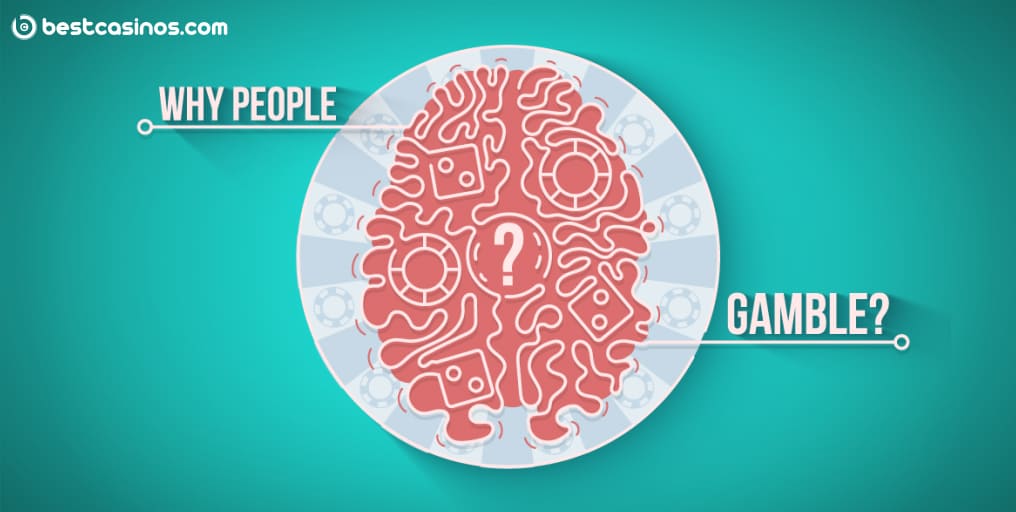
Why People Gamble: The Psychology of Gambling
In one of our recent posts, we talked about international gambling helplines designed to provide support and assistance to players suffering from gambling addiction. The conversation about addiction helplines inspired us to stay on topic and look deeper into the matter of helplines – only this time, we are looking into the causes of gambling addiction by exploring gambling psychology.
In broader terms, we will try to bring you different perspectives on the question of gambling psychology, or why people gamble. If you wondered what happens inside our brains when we gamble, you can get additional info below.
Why Do We Gamble?
Why do people gamble?
What part of gambling psychology pushes us to play casino games? Why are gambling games entertaining to us? The answer to understanding why people gamble lies in the centuries of human evolution.
According to scientists, long before we became a technological society obsessed with handheld devices and social media, we were already hooked on games.
The earliest traces of gambling games were found in the Palaeolithic period, so it’s not too far-fetched to say wagering has been a part of our lives since the dawn of civilisation. And if it’s been in our lives, it’s part of our gambling psychology now.
Regardless of age, gender, and profession, we all enjoy gaming. Of course, the nature of our games may differ, as well as gaming habits in general, but one thing is sure – we all do it. Games have been embedded into our daily routine since the beginning of time.
In today’s society, there’s general bias when it comes to gaming. Although many find gaming to be an activity of leisure with more harm than gain, it’s actually not.
The purposes are multitudinous – we learn through games, we practice skills, and we have fun. We get to socialise with others, learn important rules and life skills, combine mental and physical strengths to perform various activities.
But what do we do with gambling? And when does it become too dangerous and classified as gambling addiction?
Common Reasons Why People Gamble

To most players, gambling – like other forms of gaming – is a fun hobby. And it’s good if it is because this means the players have full control over their actions.
But what makes a player choose gambling games? What is so alluring about gambling games to so many players?
The four common reasons players cite as motivation for gambling are:
- Escapism
- Adrenaline rushes and thrills
- Boredom
- Financial gain
Naturally, given the wide diapason of personality traits, players may find a slew of other reasons to play casino games. However, most players cite at least one of these four reasons as their main drive for gambling.
Out of these four, escapism and financial gain may be extra dangerous.
Various gambling psychology experts say players who use gambling as a form of escape are individuals who want to avoid facing real-life problems. The difficulty of facing life has degrees – and to a certain extent, it is not considered a major problem. However, by entering the fictional world of their favourite casino games, players seeking escape may lose track of time, become enmeshed in their games, and become disassociated from the real world. The willingness to disassociate from reality by spending hours inside a virtual casino lobby is a double-edged sword which can cause big problems if the gambling habit evolves into addiction.
On the other hand, gambling to win money can cause even bigger headaches (and faster). The main reason why it is so dangerous is that it persists even though most players are well-aware of the losses which come hand in hand with wins. In other words, players are ready to invest a lot of money knowing they will lose it just because they firmly believe they might win big.
Gambling Habits Based on Age, Country, and Gender
No two players are the same, but experts have found some similarities between groups of punters based on their age, place of residence, and gender. The key to understanding what causes gambling addiction is understanding the player base, and it’s usually done by studies researching specific groups.
Gambling statistics are a rich mine of information we can use to decipher the gambling phenomenon. According to Statista, the largest percentage of players in Great Britain who gambled in 2021 and 2020 are aged 45 to 54 (51%). They are closely followed by players aged 55 to 64 (47.4%), while the age group which gambled the least in 2021 (and 2020) are players aged 16 to 24 (30.6%). Moreover, in the past four years, the percentage of the youngest age group has dropped (from 36% to 30.6%).
According to this research, UK players aged 45 to 54 are more likely to partake in gambling, with 51% of them stating they have wagered money on games in the past four weeks. But it’s not all.
According to a second study, even though the 45-54 age group gambles the most, they are less likely to develop gambling addiction than players aged 35 to 44. The most recent study done in March 2021 shows that the biggest share of problem gamblers in the UK (1.1%) affects the 35-44 age group. Here’s another interesting highlight of the study: no respondents aged 65 and higher considered themselves problem gamblers. The omnibus survey included 4,009 respondents, all citizens of Great Britain.
Gender-based research points to a prevalence of male players who wager higher amounts on skill-based games, rather than low-stake casual games like women prefer. Furthermore, men tend to play for financial gain and adrenaline, while women gamble out of boredom or to escape.
Women in Gambling – How Girls Play Casino Games
Gender-based misconceptions are frequent in the gambling industry, especially as gambling has been considered a male-dominated industry for so long. However, the past few years have seen a change in the narrative, and conversely, an increase in female perspective inclusion in gambling-related topics. Gambling psychology studies show a better focus on female players, thanks to which we have a better insight into female gambling habits.
Women are mostly motivated by fun rather than risk, so they tend to pick luck-based genres and casual games rather than high roller tables. Slots are a fan-favourite choice, but they also enjoy certain table games which aren’t as adrenaline-packed as blackjack and craps.
But Where Are Those Female Players?
The reason why we don’t hear about female gamblers as much is that they tend to gamble in private rather than publicly. Why? Here’s a list of typical reasons:
- Women feel greater shame in gambling than men.
- Female players tend to feel guilty because they are gambling.
- They want to keep their social status and reputation.
- They are afraid they will lose the respect of their families.
Society is not very friendly towards men who gamble, but the stigma is even harder on women who like to partake in the same activities. In the eyes of society, prejudice and bias force girls to believe a woman who gambles is not respectable, if she loses the money she would be rejected by her entire family and close friends. This aspect proves to be a very powerful motivation, so women have to pick isolated games, i.e. not social. Examples include slot games, as well as online casino games in general. They are not physically seen playing games, so the whole experience – both good and bad sides of it – are their only. If a girl makes a mistake and loses a lot of money, it’s her shame only, as losing at a table full of people is more humiliating than doing it in private.
This form of isolation adds fuel to the psychological conflict a player (of any gender) can feel. Therefore, women are more likely to suffer from depression and anxiety if they are gamblers, mostly because of the stigma attached to them. However, the public gambling psychology records and stats show mostly men suffer from gambling addiction, rather than women. However, we consider this a consequence of the underrepresentation of female punters, rather than credible information.
The Science of Gambling & Effects

Let’s talk science! What happens in the brain when you gamble?
The scientific side of gambling psychology starts with dopamine. Most gaming activity revolves around dopamine. The satisfaction neurotransmitter responsible for transferring signals between nerve cells is released when we do something fun, including play gambling games.
However, before we get to dopamine, let’s talk a bit about the place where the magic happens.
According to a study done by Brain Connections, gambling activates the brain’s reward system located in the ventral striatum. When you gamble, this area lights up. The reward system is a cluster of structures which together activate the release of dopamine. Dopamine plays a key role in gambling, which is why we’ll focus on the reward pathways that we use whilst playing casino games.
The other part of your brain that activates during gambling is the pre-frontal cortex. The prefrontal cortex acts as the stop button, as it mostly handles impulse and cognitive control, and decision-making. For most players, there’s a healthy exchange between these two areas, which results in a player having an enjoyable experience which can be stopped whenever the person decides to quit.
So far so good!
To sum it up: when you play games, the reward system activates dopamine release, making you feel happy because you are enjoying the game. However, the pre-frontal cortex is there to pull the plug the second you start feeling anything less than happy.
Psychological Process Behind Winning (And Losing)
Here’s a general misconception about the psychology of gambling: gamblers feel the thrill only when they are winning. This is not true! The reward system releases dopamine when you win, yes, but an experiment done by Professor David Nutt and BBC shows players get excited while they wait for the result as well. The feeling of victory produces the same high as simply anticipating the round outcome – which significantly clarifies the process of evolving from recreation to addiction. It is important to understand – casino games don’t instantly make you a problem gambler, but you are always at risk.
Compulsive Gambling Psychology

In gambling psychology, compulsive gambling, or problem gambling, is an impulse-control disorder defined as the uncontrollable urge to wager.
The typical symptoms of gambling addiction are:
- An increase in the amount of money wagered on games
- Spending more and more time at casinos or betting sites
- Intrusive thoughts about betting
- Feelings of stress and anxiety related to betting activities
- Borrowing/stealing money to fund wagering
- Keeping gambling a secret from family and friends
- Wagering money which you cannot afford to lose/don’t have
- Not being able to stop whenever you want to
However, millions of players spend years gambling but never end up as problem gamblers.
At what point does the fun turn sour? How can we know if we are in the wrong and gaming is endangering rather than empowering us? Where is the line and how do we cross it?
What Causes Gambling Addiction
The easiest way to explain why some players develop addictions (and others do not) is by deciphering the brain patterns again.
It’s time to turn to science. Facts from various studies on the effects of gambling on the brain show that most of us experience an immense release of dopamine – the joy neurotransmitter – which produces a high few things can top. However, problems in paradise arise when the reward hub weakens, meaning it is trickier to activate. This leads to an increased need for stimulation. Players with a gambling problem (or a pathological gambling addiction) have less activation in reward pathways, hence they increase the stakes and play longer to feel the same thrills. A similar process happens with drug addicts.
But we aren’t aware of the processes happening inside our brains. What we are aware of are dozens of other factors which may increase the chances of developing a gambling addiction.
The weakened reward pathways activation is often a consequence of gambling, but it can also be the cause of gambling addiction. People born with Reward Deficiency Syndrome (RDS) have dopamine deficiencies, so they find it harder to feel motivation unless there is a strong source of stimulation. If a person with a dopamine deficiency starts gambling, they have a higher chance to develop an addiction than others who do not have a deficiency of this neurotransmitter. Therefore, genetics can play a massive role in developing gambling addiction!
On the other hand, we must pay attention to an array of cultural and psychological factors as well. Playing casino games in a setting where it’s culturally acceptable (or even encouraged) makes players more susceptible to gambling addiction harm, including erroneous beliefs such as illusory control and the gambler’s fallacy, and an unwillingness to admit that there is a problem.
It’s Not All on the Players
Players might be the ones who choose to visit the casinos, play the games, and invest real money. In most cases, it’s their conscious decision to be there… right?
Turns out – no, the players are not the only ones who choose how long they’ll play there. Casinos – both land-based and online – use various tactics to lure in players and make them stay. One example is the notorious absence of windows and clocks which ‘helps’ players lose track of time (so they’d stay inside longer). But the window and clock thing is just one of many, many examples of casinos’ master manipulations of players.
The goal is always the same – bring in the customers and make them stay. But practices may be different from casino to casino. Here’s a frequent question heard here at BestCasinos:
Can gambling companies play on people’s psychological needs?
They certainly can! A favourite method is the use of lobby layout to swerve the players into staying a bit longer. The position of the tables, the selection of games standing at the entrance in contrast with those in the back, this all affects the players. Plus, you wouldn’t believe how much colours mean! The use of specific colours, such as darker hues and warmer colours, is inviting, as those games typically involve action and adrenaline. In contrast, cooler colours are soothing, so casinos tend to use these colours at the entrance. In online casino terms, the homepage might feature calming colours, while the lobby would sport something vibrant.
As you can see, casinos use gambling psychology tricks on their players to ensure they are staying online and wagering.
Conclusion
Gambling addiction is a serious disorder. Most players never develop an addiction, but the path from leisure to addiction is unbelievably short. The answers are hidden in gambling psychology, but to unlock the wisdom, you have to have an open mind and a clear understanding of your gambling habit.
If you or your loved ones feel anxious, afraid, or agitated because of your gambling habits, please don’t hesitate to seek help by consulting organisations listed here. Have fun and gamble responsibly.













BestCasinos team consists of online casino experts dedicated to spreading their knowledge and experience to a wider audience, all in effort to help even the most inexperienced players gain their footing in this exciting industry.